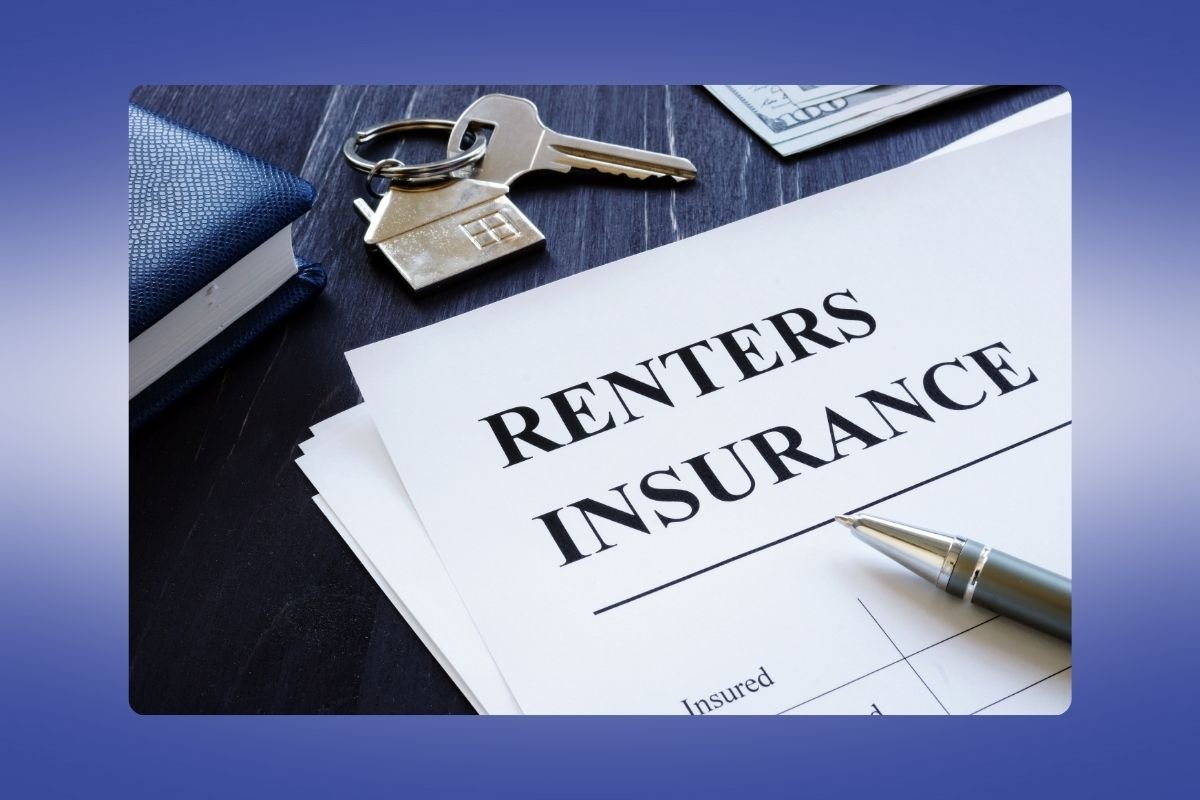Introduction to Renters Insurance
Renters insurance is a type of insurance policy specifically designed for individuals who lease or rent their homes, apartments, or other living spaces. This policy offers crucial financial protection for tenants, safeguarding their personal belongings and providing liability coverage for various unforeseen events. In New Jersey, where renting is a common practice, understanding renters insurance is vital for residents to ensure they are adequately protected.
The primary purpose of renters insurance is to cover personal property against various risks such as theft, fire, or water damage. When someone rents an apartment or home, their landlord’s insurance typically only covers the building itself, leaving tenants vulnerable in the event of loss or damage to their personal belongings. Renters insurance steps in to fill this gap, allowing individuals to claim compensation for items such as furniture, electronics, and clothing that may be lost or damaged under covered circumstances.
In addition to personal property coverage, a key component of renters insurance is liability coverage. This coverage protects tenants from financial loss in case someone is injured while on their rented property or if they accidentally cause damage to someone else’s belongings. In New Jersey, liability coverage for renters insurance can help cover legal expenses and medical bills, ensuring that renters do not face significant financial burdens from unexpected incidents. Moreover, many renters insurance policies also include provisions for additional living expenses, which may cover temporary accommodation costs should the rented property become uninhabitable due to a covered event.
For New Jersey residents, having a comprehensive understanding of their renters insurance policy, including liability coverage, is essential for safeguarding their financial future while living in a rental property. As renting increases in popularity, so does the necessity for robust and adaptable insurance solutions tailored to the unique needs of tenants.
What is Liability Coverage?
Liability coverage for renters insurance is a critical component designed to protect policyholders from legal and financial ramifications arising from injuries or property damage sustained by others on their rented premises. This form of coverage serves to safeguard individuals in situations where they may be deemed legally responsible for incidents occurring within their rented property. For example, if a guest slips and falls in your apartment, liability coverage can help cover the costs associated with medical bills, legal fees, and potential settlements or judgments resulting from a lawsuit.
It is essential to distinguish between liability coverage and personal property coverage when discussing renters insurance. While personal property coverage protects the insured’s belongings from risks such as theft or fire, liability coverage serves a different function altogether. Essentially, liability coverage for renters insurance in New Jersey ensures that if someone is injured or experiences damage on the premises, the financial burden does not fall squarely on the policyholder. This distinction is significant, as many renters mistakenly believe their personal property insurance will cover them in such incidents, which is not the case.
Moreover, the need for liability coverage cannot be overstated, particularly in a state like New Jersey, where incidents can quickly escalate to costly legal battles. Renters should be proactive in understanding the amount of liability coverage they require, which often varies based on lifestyle, rental circumstances, and personal assets. Evaluating the potential risks associated with rented property can also inform decisions on the appropriate level of coverage needed. In a nutshell, liability coverage is not merely an optional safeguard but rather a vital aspect of renters insurance that provides peace of mind and security against unforeseen events.
Importance of Liability Coverage in Renters Insurance
Liability coverage for renters insurance is a critical component that safeguards individuals from potential financial devastation resulting from unforeseen accidents or incidents within their rented premises. In New Jersey, where rental lifestyles are prevalent, understanding what is liability coverage for renters insurance can potentially save one from significant out-of-pocket expenses. Essentially, this type of coverage protects tenants against claims made by others for bodily injury or property damage incurred while residing in a rented property.
One common scenario showcasing the necessity of liability coverage involves accidents occurring within the rented dwelling. Imagine a guest visiting your apartment who inadvertently slips and falls on a wet floor, subsequently sustaining an injury. Without adequate liability coverage, the renter may be held financially responsible for medical expenses and other related costs, which could quickly escalate into substantial amounts. Furthermore, if the injured party decides to file a lawsuit, the legal fees could be overwhelming for someone without liability protection.
Another critical situation pertains to damage resulting from tenants’ actions to neighbors’ properties. For instance, a fire igniting within a rental unit could potentially spread to adjoining properties, causing devastating damage. In such cases, liability coverage for renters insurance in New Jersey would cover the repairs and associated costs, protecting the tenant from having to pay for the damages directly. The financial repercussions of being uninsured in these circumstances can be life-altering, leading to crippling debt or even bankruptcy.
Therefore, having liability coverage as part of a renters insurance policy is not merely a prudent choice but a necessity for anyone renting property in New Jersey. By understanding what is liability coverage for renters insurance, tenants can appreciate the peace of mind that comes with knowing they are protected against various unforeseen liabilities.
What Does Liability Coverage Typically Include?
Liability coverage for renters insurance in New Jersey is designed to protect individuals from financial loss due to unforeseen events that may occur within their rental premises. This form of coverage typically includes several key components that are essential for safeguarding renters against potential legal and financial exposure.
Firstly, liability coverage includes protection against bodily injury claims. If a guest sustains an injury in your rented residence due to negligence—such as a slip and fall—this coverage can pay for medical expenses incurred by the injured party, up to the policy’s limit. Additionally, liability coverage also encompasses property damage, ensuring that you are covered if you accidentally damage someone else’s property while renting.
Another significant aspect of liability coverage is the inclusion of legal expenses. Should you find yourself facing a lawsuit due to claims against you—like slander, defamation, or other negligent acts—your renters insurance policy can assist in covering the associated legal fees. This can be a vital safeguard, as these expenses often escalate quickly and can be financially devastating without appropriate protection.
Furthermore, liability coverage for renters insurance in New Jersey typically includes a provision for medical payments to others. This means that if a visitor is injured on your property, your policy may cover their medical expenses regardless of who is at fault. This feature can facilitate peace of mind for renters, knowing that guests are taken care of even in unfortunate circumstances.
It is important for renters to thoroughly review their insurance policy to fully understand the coverage limits and any exclusions. Common misconceptions often arise regarding what is or isn’t covered, making it imperative for renters to be informed when choosing their liability coverage. Regularly consulting with insurance professionals can clarify any uncertainties and ensure adequate protection is in place.
How Much Liability Coverage Do You Need in New Jersey?
Determining the appropriate amount of liability coverage for renters insurance in New Jersey is a critical decision that depends on several personal factors. To assess your individual needs, consider your income, assets, lifestyle choices, and potential risk factors associated with your living situation.
Firstly, your income level can influence the extent of liability coverage you may require. Generally, individuals with higher incomes may benefit from more substantial coverage limits, as they might have more assets to protect in the event of a liability claim. For example, if you are renting in a higher-cost area or have a job with a significant salary, it would be wise to evaluate your coverage limits accordingly. A good rule of thumb is to match your liability coverage to the value of your assets, providing an extra buffer for any unforeseen incidents.
Moreover, the type of lifestyle you lead can also impact your needs. For example, if you frequently host gatherings or have regular visitors in your home, it is essential to consider the increased risk of accidents. If someone were to be injured in your rental property, having adequate liability coverage can protect you from incurring substantial medical costs or legal fees. Additionally, assess any unique risk factors that may be associated with your living circumstances. If your rental is in a densely populated area or near potential hazards, you may need higher coverage limits.
Ultimately, while evaluating your liability coverage needs, it is crucial to strike a balance between sufficient protection and affordability. Consult with your insurance provider to discuss the various coverage options available and ensure that your liability coverage for renters insurance in New Jersey meets your personal requirements. Taking these steps will allow you to secure your financial future while living in a rental property.
Common Exclusions in Liability Coverage
When considering what is liability coverage for renters insurance, it is essential to understand that not all situations are covered under such policies. Certain exclusions determine where liability coverage may not apply, which can significantly impact policyholders in New Jersey. First and foremost, intentional acts are a major exclusion. If a renter intentionally causes damage to another person’s property or injures someone, the liability coverage for renters insurance in New Jersey will not provide protection. It is crucial for renters to recognize that they cannot claim liability for their intentional wrongdoing, regardless of the circumstances.
Another important exclusion involves contractual liabilities. This scenario arises when a renter agrees to assume responsibility for certain damages or losses through a lease or other agreements. In these cases, standard liability coverage typically does not extend to claims related to contractual obligations unless specified otherwise in the policy. Therefore, renters need to be aware that their liability coverage may not mitigate risks associated with breaches of contract or agreements that they have willingly entered into.
Additionally, pet ownership can introduce its own exclusions within liability coverage. Many renters insurance policies exclude liability related to specific dog breeds deemed dangerous or aggressive. For instance, if a tenant owns a breed that falls under such a classification, any incidents involving their pet could lead to liability claims that are not covered by their renters insurance. This distinction is vital for renters to consider, as owning a dog may increase potential liabilities and negate coverage options available under their policy.
Understanding these common exclusions is crucial for ensuring adequate preparation for adverse events. When assessing what is liability coverage for renters insurance, being aware of these limitations helps tenants make informed decisions and maintain appropriate risk management practices.
How to File a Liability Claim
Filing a liability claim under your renters insurance can be a straightforward process if you follow the necessary steps carefully. To initiate a claim, the first action is to document the incident thoroughly. This includes taking photographs of the damage, collecting contact information of any involved parties or witnesses, and noting the specifics of what occurred. This documentation will serve as vital evidence when you report the claim to your insurance provider.
Once you have gathered all necessary documentation, it’s important to report the incident to your insurance company as soon as possible. Many New Jersey renters insurance policies stipulate that claims should be filed within a specific time frame, often within 30 days after the incident. Delaying the reporting can hinder your chances of receiving the compensation you deserve under your liability coverage for renters insurance.
When you reach out to your insurance agent, be prepared to provide all relevant information regarding the incident. This includes your policy number, details of the event, and the documented evidence you collected. Clear and concise communication is crucial as it ensures that the agent has a comprehensive understanding of the situation. Additionally, clarify the scope of your liability coverage for renters insurance; understanding what is included in your policy can streamline the claims process.
After filing the claim, your insurance company will guide you through the next steps, which typically involve an investigation of the incident. Keep an open line of communication with the insurance representative, as they may require further information or clarification. Furthermore, maintaining a personal log of all interactions can help track the progress of your claim and serve as a reference if any issues arise.
In conclusion, adhering to a methodical approach in filing a liability claim will facilitate a smoother process. Ensure you understand your renters insurance policy details, stay proactive in communication, and provide thorough documentation to maximize the support you receive.
Tips for Choosing the Right Renters Insurance Policy
Selecting the appropriate renters insurance policy is crucial for ensuring adequate protection, especially regarding liability coverage for renters insurance in New Jersey. The first step in this process is to thoroughly compare various coverage options available in the market. It is essential to evaluate not only the coverage limits but also the specifics of what is included in the policy. Different insurers might offer various enhancements, such as coverage for personal liability or additional living expenses, which can be vital in your decision-making process.
Understanding the terms and conditions of the policy is equally important. It is advisable to read through the policy details to grasp precisely what is covered and what might be excluded. Pay particular attention to clauses related to liability coverage, as this determines what protection you have in the event of an accident or incident occurring in your rented space. Some policies may offer higher limits—and understanding these intricacies can help you choose a plan that aligns with your specific needs.
Furthermore, consider the potential to bundle your renters insurance with other types of coverage, such as auto insurance. Many insurers offer discounts for bundling policies, which can lead to significant savings over time while also fulfilling your liability coverage needs. Engaging with an insurance agent can also provide you with personalized advice tailored to your circumstances and ensure that you are receiving the best possible coverage.
In conclusion, selecting the right renters insurance policy requires a careful examination of coverage options, policy details, and potential discounts. By prioritizing these aspects, you can effectively determine what is liability coverage for renters insurance that meets your individual requirements.
Conclusion: Securing Peace of Mind with Liability Coverage
In New Jersey, having liability coverage for renters insurance is crucial for providing not just financial security but also peace of mind for tenants. This type of coverage is designed to protect renters from potential legal and financial repercussions arising from accidents that may occur within their rented space. For instance, if a guest slips and falls, liability coverage can help cover medical expenses and legal fees if the injured party decides to sue. The financial implications of such incidents can be significant, making liability coverage an essential component of renters insurance.
Moreover, many renters may underestimate the risks involved in their day-to-day lives. Common activities, such as hosting friends or engaging in home maintenance, can lead to unforeseen accidents. With liability coverage for renters insurance in New Jersey, individuals can rest assured that they are protected against these risks, ensuring that a single incident does not lead to severe financial strain. It is worth noting that this type of coverage is often more affordable than many people realize, making it an accessible option for a broad range of tenants.
As you reevaluate your current insurance needs, consider whether your existing coverage sufficiently protects you from unexpected incidents. If you do not already possess renters insurance, now may be the ideal time to investigate your options. By obtaining liability coverage, you can ensure that you are safeguarded against potential legal claims and damages. Ultimately, understanding what is liability coverage for renters insurance empowers individuals to make informed decisions that can lead to greater security and peace of mind in their rental journey.
FAQ: Understanding Liability Coverage in Renters Insurance for New Jersey Residents
1. What is liability coverage in renters insurance?
Liability coverage** helps protect you financially if you’re found legally responsible for causing bodily injury or property damage to someone else while they’re in your rented home or apartment.
2. Is renters insurance required by law in New Jersey?
No, renters insurance is not legally required in New Jersey. However, landlords may require it as part of your lease agreement.
3. What does liability coverage typically include?
Liability coverage in renters insurance often includes:
-
Medical expenses for guests injured in your home
-
Legal defense costs if you’re sued
-
Damage you accidentally cause to someone else’s property
-
Injuries caused by your pet (varies by insurer and pet type)
4. What is not covered by liability insurance in renters insurance?
It typically does not cover:
-
Damage to your own belongings
-
Intentional harm or damage
-
Business-related activities from home
-
Injuries to you or your household members
5. How much liability coverage should I have?
Most policies offer $100,000 to $300,000 in liability coverage. If you have significant assets or risks, you may consider increasing that amount or purchasing an umbrella policy.
6. Does liability coverage include damage caused outside my home?
Yes, liability coverage can extend beyond your residence. For example, if you accidentally cause damage at someone else’s home or if your dog bites someone at the park, you may still be covered.
7. Is my landlord covered under my liability insurance?
No, your renters insurance does not cover your landlord’s property. It only covers your liability and personal property, not damage to the building or landlord’s belongings.
8. Will my policy cover a guest slipping and falling in my apartment?
Yes, if a guest gets injured in your home and you are found liable, the policy may cover their medical costs and your legal expenses.
9. What if my pet causes an injury or damage?
Most renters policies include pet liability coverage, but it depends on the insurer and breed of the animal. Some companies exclude certain dog breeds or exotic pets.
10. How do I file a liability claim on my renters insurance?
To file a claim:
-
Notify your insurance provider immediately.
-
Provide details of the incident (what happened, when, who was involved).
-
Submit any supporting documents (photos, witness statements, police reports).
-
Cooperate with the insurer’s investigation.
11. Can liability coverage help with legal defense costs?
Yes, if you are sued due to a covered incident, your renters insurance may pay for legal representation and court costs, up to your policy limits.
12. How much does renters insurance with liability coverage cost in New Jersey?
On average, renters insurance in New Jersey costs between $10 and $25 per month, depending on your location, coverage limits, and insurance provider.
Read More:
- Understanding Commercial Property Insurance: What It Covers in Needham
- How Does Life Insurance Work and What Are the Available Plans in New Jersey?
- Is It Cheaper to Buy Insurance Directly from an Insurance Company in Texas?
- How Much Condo Insurance Do I Need? A Best Calculator for Ohio Residents
- Understanding the Perils Covered in Manufactured Home Insurance in Texas




